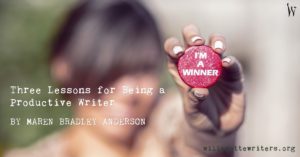My writing career began with the birth of my daughter in 2007, which changed everything. For one, I suddenly had no time to myself. In a thunderclap, I realized that my time on earth is not infinite, and if I wanted to be a writer, I had better get to it.
I began by looking for a way to force myself to write, and I found NaNoWriMo. The lessons I learned from NaNoWriMo have transformed me into a person with a life and a productive writing schedule. These lessons may help you as well, even if you don’t try NanoWriMo.
 NaNoWriMo is a writing competition that takes place each November. Hundreds of thousands of crazy people (431,626 in 2015) gather online to try to write 50,000 words of the first draft of a novel in thirty days. That’s 1,667 words a day if you are wondering.
NaNoWriMo is a writing competition that takes place each November. Hundreds of thousands of crazy people (431,626 in 2015) gather online to try to write 50,000 words of the first draft of a novel in thirty days. That’s 1,667 words a day if you are wondering.
NaNoWriMo kick-started my writing career because it provided a deadline, and it forced me to make time, a lot of time, to write. I completed the 50K in 30 days challenge that year and four other times since.
“Cannot” vs. “Am Not”
Now for the life-changing part: once I completed a novel manuscript in a month, I realized that any time I am not writing a book, the reason isn’t because I cannot write a book, it is because I am not.The most difficult part of writing for me and many other writers is not putting words onto the page. Our trouble is that the world thinks that writing magically happens and that writers can write at any time. Therefore, the world thinks that it isn’t interrupting, and it is good at convincing writers (myself included) that we aren’t doing anything important.
The world is not correct. Writing has to be a priority, or I never write. This is what NaNoWriMo taught me, and how it changed my life.
Lesson One: Shitty First Drafts and Writing Forward
The first lesson I took away is the concept Anne Lamott talked about in Bird by Bird: the shitty first draft. I used to be the writer who created and edited at the same time, and it took me forever to write anything. However, when I am writing 50K in 30 days, I just don’t have time to edit.
Here’s what helps: mark edits you know you have to fix, but write as if the edits have already been done. Your draft will be “shitty,” but then you will edit the whole document later. This habit will up your daily word count.
Here’s an example: I sat down at the computer one morning and, BAM!, my character Bailey was a girl. She was a man the day before. I sighed deeply, wrote “[BAILEY IS A GIRL]” in the margin and wrote the rest of the book as if she had always been female. I went back and changed the earlier parts of the story after I finished the draft. Changing the earlier parts the day Bailey first flipped genders would have broken my creative stride.
Lesson Two: Write First
But how do you deal with people when they start asking for things when you need to write? In order to have a life and write a book, you have to learn when to write and how to say “no.”
When to write? The answer is to write first. For some people, this means getting up at 5 AM and writing before the world starts making demands. This does not work for me because I am a zombie before 8 AM. However, when I do sit down to write, I write first, before email, before lesson plans, before grading papers. Even though my goal is 60 minutes of writing a day, if I can get 15 minutes of writing in first, I feel like I have made progress that day.
Lesson Three: Say “No”
The last lesson is that if you want to be a productive, professional writer, you need to treat writing like a priority. Like, you know, a job. In order to do that, you have to schedule a regular writing time and treat that time as an appointment that cannot be broken.
This might mean that you say “no” a lot. It means you might pay for a little extra daycare. It means that you need to write during your writing time and not surf the web or play Wordiest. And you may still have to remind yourself that the world can spare you for one hour out of twenty-four. If you are like me, you need this time to stay sane.
Treating my writing life as a priority has not lost me friends. My family still loves me even though sometimes our dinner comes from a frozen pouch. No one knows I answer emails after I write 1,000 words. I have a life, a job, and I am a productive writer. But it took NaNoWrimo and a shift in my attitude to achieve this.
To be a productive writer, you have to act like a professional writer.
—
Maren Anderson will be presenting a talk about preparing for NaNoWriMo on Tuesday, October 18, 2016, at Willamette Writers Salem. Join us and kick off your next project.
Maren’s latest novel, Closing the Store, is available for pre-order here.
